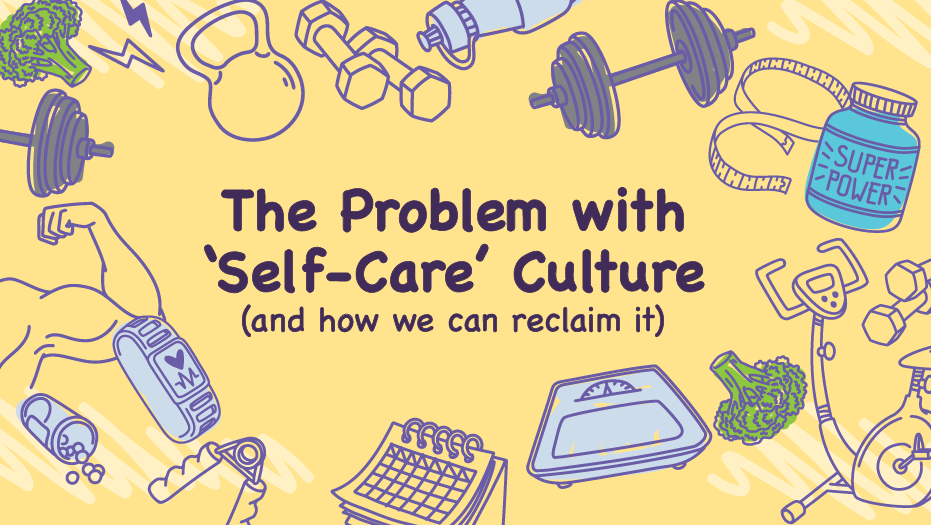 22nd February 2021
22nd February 2021
The problem with 'self-care' culture (and how we can reclaim it)
We love self-care. In fact, we’d go so far as to say it’s essential to our wellbeing. But the term has been hijacked by social media over the past few years, often turning self-care into just another idealised lifestyle.
Influencers like Gywneth Paltrow - as just one high-profile example - promote clean eating, expensive skincare, perfect teeth and organic cotton as self-care. Even genuine wellbeing practices like meditation and exercise are glamorised—essentially to make money off us.
The problem with this self-care culture is that rather than supporting our wellbeing, it only fuels our sense of inadequacy. Self-care becomes another social media mirage that damages our sense of self-acceptance and authenticity.
Yet, real self-care is a gold standard tool in supporting good mental health. So, how do we re-claim self-care that works for us?
What actually is self-care?
Everyday self-care is as simple as showering, brushing our teeth, and taking care of our medical needs. These simple practices are called Activities of Daily Living (ADLs) and are indicators of good mental health. But when we’re suffering, it becomes much harder to take care of ourselves— we often begin to act in ways that can be unhelpful to us, like avoiding loved ones or under-eating.
But continuing to take care of ourselves during tough times can actually help ease those negative feelings.
Self-care becomes another social media mirage that damages our sense of self-acceptance
In therapy, this is called ‘opposite action’—by acknowledging our feelings, and acting opposite, we can help change those feelings. For example, self-care may mean getting up and dressed, when we want to stay in bed. Or watching a comedy, when we’re feeling down.
It’s not the same as running away from our feelings—acting opposite is just one tool we can use to take care of ourselves, once we've acknowledged those feelings.
The truth about diet and exercise
Exercise and healthy eating are two of the most important tools in our self-care toolkit. But we should approach it with kindness towards ourselves—and that’s even more true if we have physical barriers to exercise.
Before we try to change our outer behaviours, we need to create a positive relationship with our inner selves through helpful thinking, nurturing good relationships and self-acceptance—that’s why we’ve focused on these for Feelgood February! If we learn a more positive relationship with our inner selves, we will more naturally build a positive relationship with our outer selves—our behaviours and the way we take care of ourselves.
Try not to compare yourself—cancel the influencers that promote unrealistic lifestyles.
We can choose to exercise in a way that nurtures our bodies, in whatever capacity we have—it’s not about burning kilojoules, it’s about moving our body in a way that makes us feel good about ourselves. And we can choose to eat in a way that shows care towards our bodies.
Sometimes that takes discipline—and we’ll need to call on our ‘acting opposite’ skills—like choosing to have a healthy breakfast when we want leftover pizza! (we’ve all done it 😊). But ultimately, if we balance self-love with discipline, we will naturally orientate ourselves towards self-care.
Be true to you
Self-care is anything and everything we do that helps us to lift our mood, enjoy life and stay connected with our true self. It’s anything that enhances our sense of wellbeing.
Some of us feel really good when we get up early and hit the gym every day. But for some of us, that would be stressful and cause anxiety. Some of us need rest and a quiet space, while some of us love socialising.
Try not to compare yourself—cancel the influencers that promote unrealistic lifestyles. Get in touch with what lifts you up, without judgement towards yourself. There are no ‘shoulds’ in self-care: do what makes you feel good.
That is even true of so-called ‘pampering’. A bubble bath or getting a massage may be just what you need. But if it feels like hard work, don’t turn it into another obligation in your life.
At heart, self-care is the outward action of inner compassion. It is about showing kindness to yourself and giving yourself a break. In turn, this will give you the resilience and energy to face the challenges of life.
Self-care is not just for beautiful people, it’s for all of us.
THIS WEEK’S CHALLENGE: Find your fun stuff
If you don’t already know what your ‘self-care’ practices are, ask yourself these questions:
What is enriching to me?
What gives me a sense of fun?
What gives me energy to face the responsibilities in my life?
Is it good for me?
Now, take time this week to:
1. Eat a meal you really enjoy
2. Move your body in a way that feels fun (in whatever capacity you can)
3. Doing something that is truly just for you.
BE IN TO WIN: This is the final week of Feelgood February and your final chance to win a weekly care package worth over $150! This week, just share a self-care idea you love to do in the comments.
